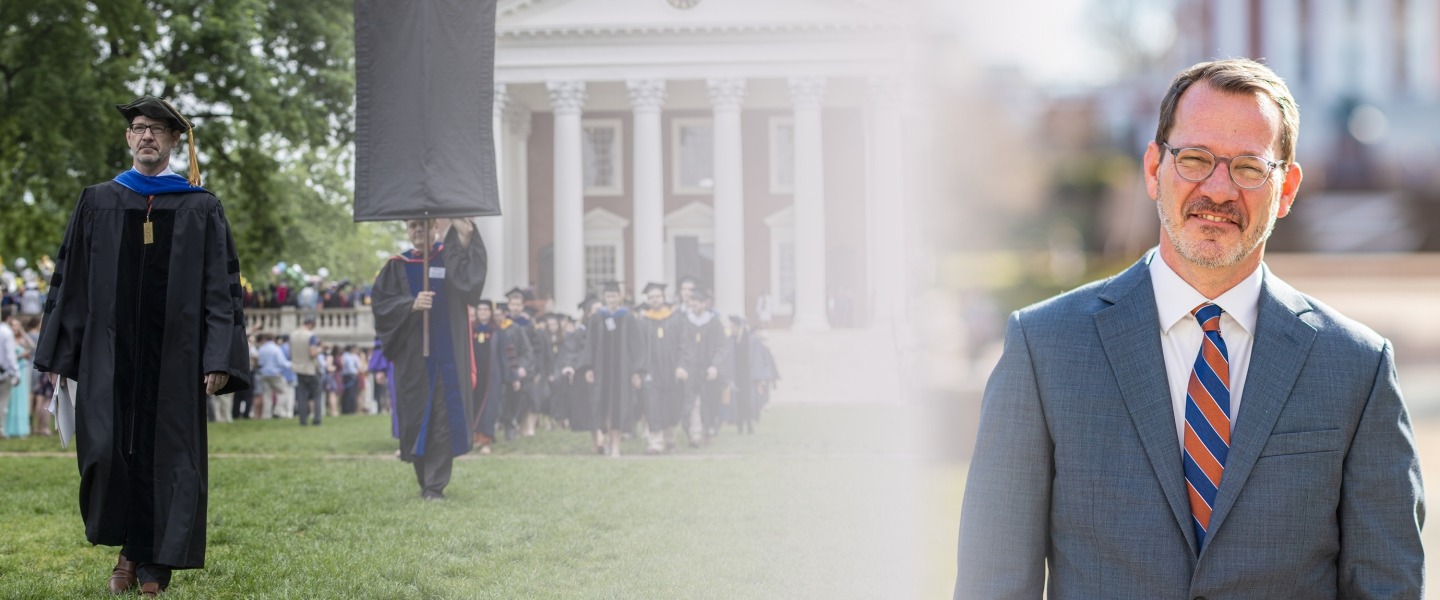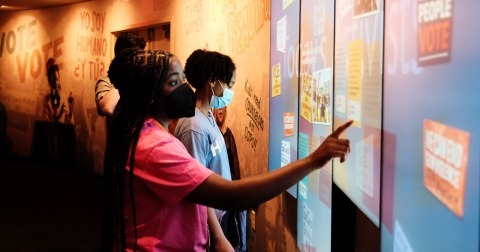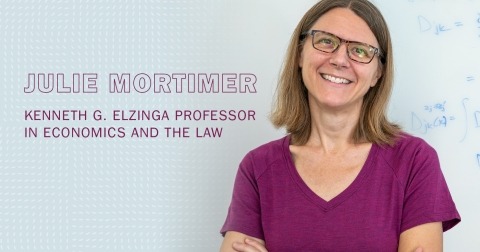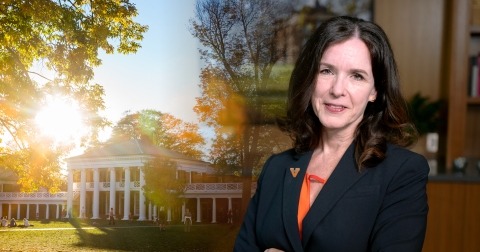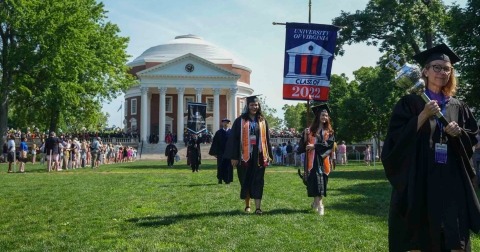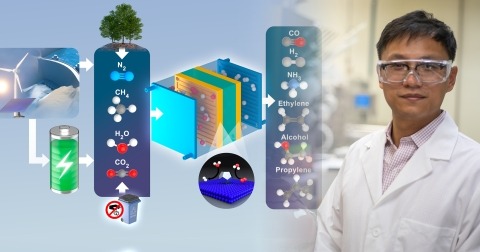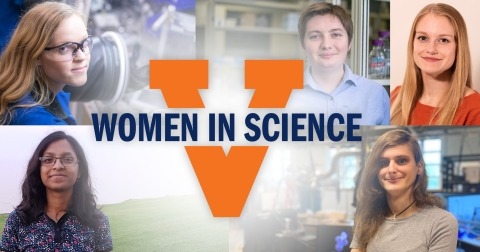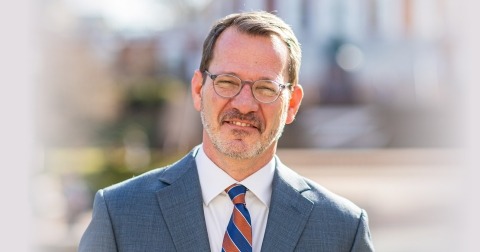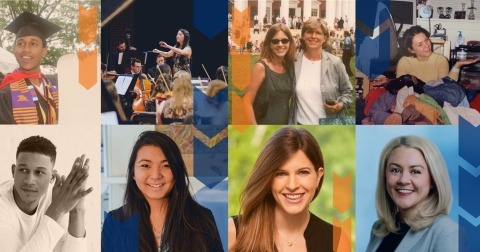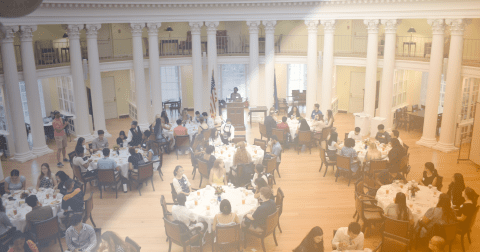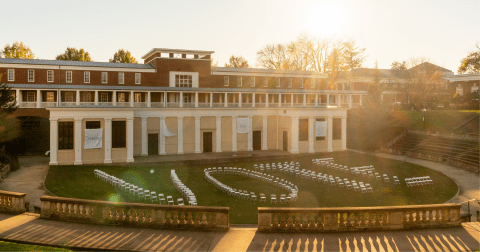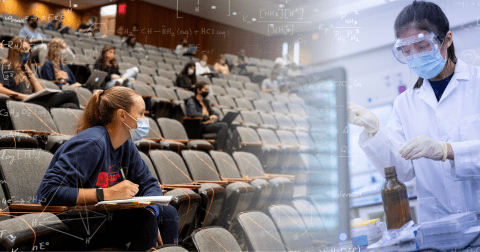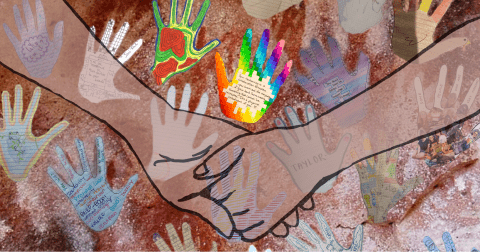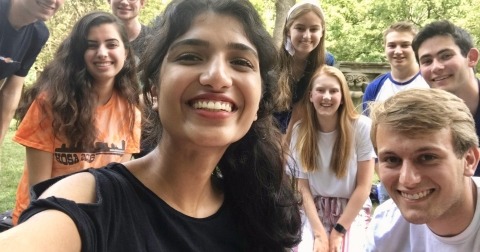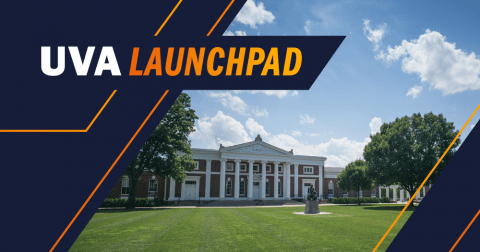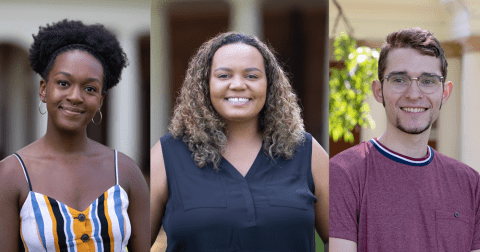The five years that Ian Baucom and his family spent living on the Lawn at the start of his tenure as the Buckner W. Clay Dean of Arts & Sciences provided a deep immersion into the rhythms and traditions of the University of Virginia. Baucom and his wife Wendy opened the doors of their Pavilion X home to more than 800 students at -a-time for open house events as well as smaller gatherings, including times when students needed a place to confide in (or speak plainly to) University leadership.
From his Pavilion home, he watched a thousand students flood the Lawn at midnight for a joyous snowball fight and enjoyed a front-door view of the late-night celebration for the UVA men’s basketball team’s NCAA national championship run in 2019. He heard UVA’s a cappella groups hold auditions and observed groups of Muslim students roll out prayer mats on the grass. All these moments offered insight into the fullness and richness of the University, Baucom says.
Earlier this year, he accepted a new appointment as UVA’s executive vice president and provost. The eight years he spent as Dean of the College reinforced his belief in the University’s mission as a public educational institution, Baucom says, and informed his decision to take on this larger role overseeing UVA’s academic mission across all its schools.
“I have been able to experience and live, through my time as Dean and now as I transition into my role as Provost, the way that this College has contributed for 200 years to being the center of a public idea of what an American democratic society can be,” Baucom says. “It just lends an intensity, and a purpose, and a sense of excitement to everything that we do, and that really has been at the core of my wanting to be here.”
Propelling the College Forward
Baucom likes to joke that the only thing a dean is guaranteed with their appointment is the knowledge that one day you will no longer have that job. His eight years as Dean of the College and Graduate School of Arts & Sciences have ensured Baucom’s legacy, however.
At the beginning of his tenure, the College was experiencing a generational turnover of faculty that required the recruitment, hiring and retention of nearly 250 new faculty members entrusted with teaching current and future generations of A&S students. During Baucom’s leadership, the College also designed and approved the first major revision to its undergraduate curriculum in more than 40 years. In addition to securing nearly $300 million of state and University funding to improve research and teaching facilities for chemistry, psychology and other STEM disciplines, Arts & Sciences faculty generated a 50% increase in externally funded research. A range of new Ph.D. fellowships was established to recruit underrepresented students into A&S graduate programs and to support interdisciplinary clusters of graduate students in key strategic areas.
“It’s abundantly clear that those donors invested in the College because they believed in Ian and his vision and trusted him to make great things happen. Ian’s many successes honor those who have supported him. We are so fortunate to have had him as our dean.” - Gene Schutt, College Foundation President
Baucom also played a critical role in the creation of the Democracy Initiative and other College projects dedicated to researching and illuminating the challenges confronting democracy today.
College Foundation president Gene Schutt was a frequent travel companion of Baucom over the last eight years to College events across the nation, and their fundraising efforts led to nearly $520 million in gifts and pledges committed to the College.
“It’s abundantly clear that those donors invested in the College because they believed in Ian and his vision and trusted him to make great things happen,” Schutt says. “Ian’s many successes honor those who have supported him. We are so fortunate to have had him as our dean.”
Public. Democratic. Student-Focused.
Before coming to UVA, Baucom spent 17 years at Duke University as an English professor and director of the John Hope Franklin Humanities Institute. He says it was UVA’s mission as a historic and global standard bearer for public universities that lured him here. Baucom calls the College “the living embodiment of the American idea,” serving UVA’s role as “the University of the Declaration of Independence.”
“Our democracy is based on the idea that everyone should be able to participate in the shared elements of life, and I really believe that the public good of education is foundational to who we are and who we can be,” Baucom says. “The dilemma and the tragedy are that historically, we didn't invite everyone in to ‘We the People.’ We didn't include everyone at our beginning. But, still, our history has been that we have constantly expanded who's included in that promise, and that's what we're for, that constant expansion of who gets included in this place.”
Almost any conversation with Baucom is focused on or quickly comes back to students.
“We have to equip them to be ready for a social world, an economic world, a market world, a world of citizenship, a world of entrepreneurship, a world of professions, a world of service in the midst of a remarkable transformation. So, part of the public good is to give students skills. The skills of writing and thinking and analysis and historical understanding.”
Perhaps the most unique part of the College’s mission, Baucom says, is its use of the entire spectrum of the liberal arts and sciences to address fundamental value questions that prepare students to wrestle critically and thoughtfully with real world issues. War in Europe. The spread of refugee crises around the world. The environmental ravages of climate change. Baucom believes a liberal arts education remains the best way for students to not only hone their fundamental skills of empirical analysis but also to recognize the ethical obligations associated with public life.
“Students need these empirical skills that a liberal arts education provides, a fundamental understanding and empirical analysis. But knowing the facts isn’t enough. You have to start with the facts, but knowing the facts means then asking yourself, ‘Well, does this place any ethical obligation on me?’ We also have to acknowledge how really complicated questions come to us through art, and how art helps us understand the world. It brings the world to us often. Newspapers are important, social media is important, but it’s a work of art that can bring us to face human reality, and students need that as well.
“And the last thing is understanding that with any question of that sort, we’re not going to always agree with each other. There will be principled differences of thought.”
It’s a message that Baucom has shared numerous times, one that has resonated with students, parents and alumni, says College Foundation chair Lisa Smith.
“Ian is that rarest of combinations — someone who can craft an inspiring vision but who at the same time has an impressive command of all the day-to-day intricacies of running something as complex as the College. Ian really got everything that makes UVA unique and special,” she says. “The initiatives that he spearheaded were all meticulously designed to further our unique mission as ‘democracy’s university.’ His blueprint for the College galvanized the faculty to reach new heights and energized alums and friends of the University to new levels of philanthropic support.”
Standout Strategic Priorities
Among the College initiatives that have energized faculty and alumni during Baucom’s tenure, the Democracy Initiative ranks among the most notable. Established in 2018 with ongoing support from generous donors, the Democracy Initiative has helped to cement the College and UVA’s standing as a global leader for the study of democracy. The Initiative’s expanding portfolio includes faculty research labs studying the contemporary and historical issues and challenges facing democracy domestically and globally, a partnership with StoryCorps in a “One Small Step” program designed to invite people with differing political views to find common ground through conversation, and an expanding series of public projects and academic conferences.
“We believe that democracy is fundamental to our lives, that universities sustain democracy. So, the Democracy Initiative came from that,” Baucom says. “The question for us was, how do you translate that into an actual set of projects, and two parts of that emerged. One was we wanted to hold to fundamental, philosophical, historical questions.
“And then we also have to think about the challenges out there right now that we’re facing. How do our social media environments enable the possibility of more free, open democratic exchange of ideas, and how do they, as we all know, fracture and divide us? How do we think about the ways in which environmental degradation and climate change unevenly impact people, make people’s lives vulnerable and damaged, and therefore not able to fully participate alongside their fellow citizens in democratic life?”
Similarly, Baucom’s eight year run as dean will be remembered for undergraduate curricular innovation. The design of the College’s new curriculum, approved in 2019 by a faculty vote, was guided by the underlying belief that students should be invited to consider themselves actors in the unfinished work of democracy. At the same time, the new curriculum prepares the College’s graduates for the world of work, arming them with the skills they need to pursue their professional vocations.
Provost Ian Baucom discusses the academic values and commitment to the development of professional skills built into the College’s new curriculum designed during his tenure as A&S Dean.
“In many ways, our faculty were not only voting for our students, they were also voting for themselves,” he adds. “Through the College Fellows, the faculty that teach the new College Curriculum’s courses for first-year students, we’ve learned that this model is also allowing time and a structure for our faculty to learn from each other — new approaches to teaching, new ways to make courses interdisciplinary,” Baucom explained.
Expanding Programs and Academic Excellence
That same commitment to interdisciplinary collaboration can be seen in the new Program in Fundamental Neuroscience created during Baucom’s tenure as Dean. The program is less than 10 months old, but its director, biology professor Sarah Kucenas, says it has already forged collaborations with the School of Medicine and across Grounds, positioning the College as a national leader in neuroscience education and research.
“Ian’s support also has led to us currently preparing to move into the soon-to-be completed renovation of Gilmer Hall and has helped to unite and empower a group of faculty who share a common set of core values,” says Kucenas, who is also co-chairing with Baucom the national search for the next A&S Dean. “His support has allowed us to imagine even more possibilities than we did in late 2020, and the neuroscience community in the College is excited as we continue to grow, collaborate, and discover.”
“These University-led initiatives are very expensive and often more complex compared to other hires in the College because of factors that include specialized lab/field station space, collaborations with multiple schools, and startup funds. Ian recognized these factors and committed ongoing College resources to support success of both science initiatives and by successfully partnering with the School of Medicine and the School of Engineering and Applied Sciences. I believe that these initiatives will lead to a national prominence in both scientific fields.” - Dave Hill
Psychology professor David Hill, the former department chair and associate dean serving as interim dean as the search for Baucom’s successor continues, says he witnessed firsthand the amount of care that Baucom devoted to understanding and advocating for each division of the College within the larger context of being a top-ranked public liberal arts school.
“These University-led initiatives are very expensive and often more complex compared to other hires in the College because of factors that include specialized lab/field station space, collaborations with multiple schools, and startup funds. Ian recognized these factors and committed ongoing College resources to support success of both science initiatives and by successfully partnering with the School of Medicine and the School of Engineering and Applied Sciences,” Hill says. “I believe that these initiatives will lead to a national prominence in both scientific fields.”
A generational change
The effects of the College’s faculty and graduate student recruitment efforts the last eight years are poised to last decades. Baucom and the College’s leadership team sought to advance the tradition of excellence sustained by a generation of retiring faculty. At the same time, the College increased the number of tenured and tenure-track faculty from underrepresented groups by 70% and increased the number of women on the faculty by more than 30%. A growing cohort of graduate students from those same underrepresented groups also have been recruited to the Graduate School through the Bridge to the Doctorate program and other initiatives created during Baucom’s tenure.
These accomplishments have boosted the Graduate School’s efforts to diversify the academy nationwide, Baucom says, and to support a faculty that reflects the nation and world they serve.
Keisha John, the College’s Associate Dean for Diversity, Equity and Inclusion, credits Baucom for his commitment to boosting the diversity of faculty and graduate students, a commitment that led to the hiring of prominent scholars such as Ken Ono in Mathematics and Robert Gilliard in Chemistry.
“He was also instrumental in supporting the elevation of the Carter G. Woodson Institute [for African-American and African Studies] to a full academic department and in the increase of full-time faculty members in Woodson,” John says. “But he’s also breathed life into a gamut of programs and initiatives that do a good job not only of recruiting the students we want here but also providing them the necessary support they need to thrive and graduate.”
A larger project
In his new role as Provost, Baucom is co-chairing dean searches for four different schools on Grounds, including the College. As he burrows into the challenges facing the leadership searches at UVA’s School of Nursing, School of Education and Human Development, and School of Continuing and Professional Studies, it’s clear that his experience within the College has informed his understanding of the University and its mission.
“It can be hard to believe and to feel and to sense that we are part of a larger project, part of an urgent idea, and part of a historical force, but we are,” Baucom told Arts & Sciences faculty and staff last month. “And that fundamental truth remains. We are part of something bigger. We do embody a truth: not just that knowledge matters as a general idea, but that poetry matters, and philosophy matters and history matters and computational biology matters. That it’s worth dedicating your life to the study of sociology and Black culture and condensed matter physics, that all of those things add up to something without which our public life cannot thrive in any time, and especially in these times. And for giving me the chance to share that with you, I am unendingly grateful.“

